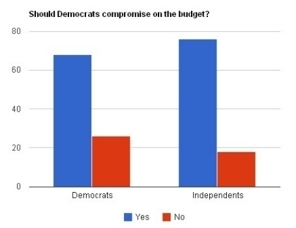Matthew Yglesias's Blog, page 2364
April 7, 2011
Ramesh Ponnuru Knows We Need More Money, Unfortunately Nobody's Told The European Central Bank

Ramesh Ponnuru has an excellent article about the role of monetary policy in the crisis, gently but appropriately chiding the right for its eagerness to embrace crank monetary views and sternly chiding the Fed for its reluctance to do enough to spark recovery. Having such a piece appear in National Review under the byline of one of the conservative movement's leading lights is a small but important step to rebuilding the cross-ideological consensus that you need to do macroeconomic stabilization.
Unfortunately, nobody seems to have told the European Central Bank which has decided to take its too-tight monetary policy and make it even tighter, ignoring the vast human suffering this will inflict even while seriously jeopardizing the viability of the Eurozone system as a whole.


Democratic Leaders Are Spineless Because Democratic Voters Like Spinelessness
Why are Democratic leaders so spineless? Ezra Klein points to persuasive polling evidence (PDF) that the Democratic likes it that way:

A more general point I would make about this is that left-wing intellectuals and writers often write as if left-wing intellectuals and writers are "the base" of the Democratic Party, then observe that the leaders of the Democratic Party aren't very left-wing, and then write about the phenomenon of the Democratic Party leaders' ignoring their base. The truth is closer to something like the actual base of the Democratic Party is the large block of voters who reliable vote Democratic and have only mildly left-wing policy preferences.


Paul Ryan's Budget Is Justified By Implausible Projections, But Doesn't Rely On Them

A savvy question from TP that I'm glad to answer since I've spend a fair amount of the past 24 hours trying to figure it out:
What would Obama's budget look like in the longer term if you use the wildly optimistic assumptions about unemployment, construction, etc used in Ryan's budget? Would Obama's budget result in a higher or lower deficit than Ryan's if you assumed a 2.8% unemployment rate?
Or to put it another way, are Ryan's numbers just driven by the Heritage Foundation's laughable macroeconomic projections? The answer is that, no, they're not. The reason is that Ryan's proposals are all oriented around shares of GDP. On taxes, for example, he proposes cuts in the income tax rates paid by high-income people and then stipulates that total revenue will nonetheless equal the Bush share of GDP via a mysterious middle class tax increase. Similarly, what he does with Medicare is first privatize it, and then stipulate that the private vouchers will grow at the rate of general inflation plus one percent. Under that plan, Medicare spending as a share of GDP shrinks by definition. This also means that every time the engineers in Silicon Valley find out a way to make a cheaper computer, your Medicare benefits go down. And he does something similar to Medicaid, and then he does it again to basically every anti-poverty program out there.
The math of this part of his agenda is totally impeccable. What's deficient is the public policy and this is where Heritage's bad math kicks in. After all, why would you enact this crazy agenda? Now in the case of Paul Ryan the answer is pretty clear—he's an Ayn Rand fanatic who believes that any effort, whether public or private, to help the poor is immoral. But it's difficult to sell that as a political agenda! So instead his argument is that we should do it for the macroeconomic benefits. What benefits? Well, the benefits the Heritage Foundation is pretending the plan will have.


The Cost of Anti-Chainism
To my eye, Washington DC looks like it has too few retail establishments. There are lots of vacant storefronts, and yet existing businesses rarely seem to fail. At the same time a freakishly large number of major national chains are unrepresented in our fair city.
(google street view)
Lydia DePillis visits the International Franchising Expo to explore the reasons why and naturally it's somewhat complicated. But at least part of the problem is that some of the most promising locations simply won't let new businesses open up:
With that understanding of D.C.'s geography, it's hard to even grasp the fact that the city is still drastically "under-retailed," as they say in government circles. We have 14 retail square feet per person, compared to the nationwide average of 23 square feet. But you wouldn't know that if you just stayed downtown, or near existing retail corridors like Wisconsin Avenue, Connecticut Avenue, U Street, or 14th Street—all in Northwest.
Of course, in many neighborhoods, a street full of chains isn't the ideal endpoint for a revitalized commercial strip. Healthy places attract and foster independent businesses that offer something different than malls across the country. Some areas, like H Street NE, have taken active steps to keep out fast food places that they fear would generate trash and tarnish the corridor's local character. And it's hard not to feel let down by the fact that Subway and Dunkin Donuts are opening in the marquee spot at 14th and U streets NW, blocks away from other locations.
I wish people would think harder about the costs of this sort of decision. I completely sympathize with the aesthetic point that one thing I like about living in a city is the existence of options that are different from strip mall homogeneity. But actually if you drive out to DC's suburbs you'll see that some of the most interesting retail in the area—including all the best independently owned Chinese and Vietnamese restaurants—is actually located in strip malls. So it's not obvious that whatever it is we're doing is succeeding all that well at creating anything other than empty spaces. At the same time, we have a lot of unemployment in this city, particularly among people with low educational attainment. And that's even though the high-end job market in the metro area is among the healthiest in the country. The approximately 20 percent of DC residents who don't have a high school degree simply aren't qualified for the kinds of office work that the area has in ample supply. But these people would be qualified to work in a KFC or a Wendy's or to drive a delivery truck or all the rest. The costs of restricting these kind of business opportunities aren't all borne by profiteering developers or landlords, the majority of economic activity goes to labor compensation so when you restrict the kind of economic activity that employs low-skill labor in a high-unemployment environment, you really hurt low-skill workers.


The Rise Of Apocalyptic Conservatism Made The Shutdown Inevitable
As you've probably read elsewhere already, talks seem to have definitively broken down and we're going to have our shutdown. I wrote for TAP last week about why this was largely inevitable:
In ordinary times, you might think that an over-the-top grassroots base would be restrained by party elites. But Tea Party millennialism is reinforced, not constrained, by key conservatives. Matt Continetti of the Weekly Standard published a long article this week accusing liberals of "paranoid" dislike of the billionaire Koch brothers, who have emerged as the leading money-men of the American right. But according to Continettit's own reporting, it's the Kochs who seem paranoid. David Koch said to Continetti, "He's the most radical president we've ever had as a nation," he said, "and has done more damage to the free enterprise system and long-term prosperity than any president we've ever had." Koch attributed this to Obama's admiration for his father, who, he explains "was a hard-core economic socialist in Kenya."
On this theory, despite his stated views, Obama is secretly a hard-core economic socialist, an ideology he picked up from his father without actually speaking to him. Newt Gingrich, who stands right at the center of the money men and the grassroots, worried on Monday about his grandchildren. "By the time they're my age," he fretted, "they will be in a secular atheist country, potentially one dominated by radical Islamists and with no understanding of what it once meant to be an American." And why shouldn't secular atheism and radical Islam coexist if Obama's brand of hard-core socialism can bring record profits to corporate America? [...]
That the midterm elections change this calculus is clear. But the rise of apocalyptic conservatism does more than shift the terms of the negotiation. It likely makes compromise impossible.
I don't like it any more than you.


In Approps Fight, House GOP Are "Getting To 'No'"
David A. Fahrenthold and Amy Gardner have a nice profile of the corner into which House conservatives have painted themselves on the looming government shutdown. They quote freshman Republican Tim Griffin of Arkansas saying "I don't want a shutdown" but when they ask him why he won't accept a compromise, he says he basically can't.
According to Michael Grimm of New York, another GOP freshman, "There are many Republicans that feel that they gave their word to their constituents that they wouldn't back down." After all, lots of Tea Partiers think a shutdown would be excellent:
I think the best insights about politics are often in books that aren't explicitly about politics, and I love a business book called Getting to Yes: Negotiating Agreement Without Giving In. A lot of what you've seen from House conservatives in this debate illustrates their points. When you want to get an agreement, you lead with principles rather than positions. And in the case of the short-term CRs, this is exactly how the House leadership has negotiated. Their principle is reductions in domestic non-defense discretionary spending. Then they try to see if there's anything Democrats prefer to a shutdown that exemplifies those ideas.
But on the ultimate deal, they're doing the reverse—leading with positions. That means defund Planned Parenthood, defund NPR, defund the Affordable Care Act, defend financial regulation, defund the EPA. One can have those policy objectives if one is so inclined. Lots of people in America don't care about women's health or the state of the environment and the avowed goal of House Republicans is to serve the banks. But these are positions that are plainly incompatible with the idea of reaching an agreement. And these guys aren't idiots. They recognize that there's no way the Democratic majority in the Senate or the Democrat in the White House will agree to all this stuff. They may say that they don't want a shutdown, but holding these things out as goals to be achieved in 2011 rather than as things that will happen if they win more elections, is just a way of insisting on one.


What A Dispute About Jacksonian America Can Teach Us About The Merits Of The Welfare State
Many thanks to the reader who correctly ascertained that I'd be interested in Jill LePore's joint review of What Hath God Wrought? and Charles Sellers' The Market Revolution. This paragraph captures something enormously important for politics in general, and not just the United States in the first half of the nineteenth century:
Howe offered an early version of his critique of Sellers at a conference held in London in 1994, in which he demurred, "What if people really were benefitting in certain ways from the expansion of the market and its culture? What if they espoused middle-class tastes or evangelical religion or (even) Whig politics for rational and defensible reasons? What if the market was not an actor (as Sellers makes it) but a resource, an instrumentality, something created by human beings as a means to their ends?" Sellers summarized Howe's argument as "Market delivers eager self-improvers from stifling Jacksonian barbarism" as against his own "Go-getter minority compels everybody else to play its competitive game of speedup and stretch-out or be run over." Fair enough. "Where Howe's assumptions suggest that I undervalue capitalism's benefits and attractions," Sellers continued, "my assumptions suggest that he underestimates its costs and coercions." Again, fair enough. But Sellers attributed these "warring assumptions" not to different evidence, methods, theories, or strategies of analysis but to the two historians' different values. Howe writes from "within the bourgeois middle-class culture," Sellers scoffed, while his own (presumably more Waldenesque) life had taught him that "relations of capitalist production wrench a commodified humanity to relentless competitive effort and poison the more affective and altruistic relations of social reproduction that outweigh material accumulation for most human beings." In other words, money talks, but it can't buy you love.
Note that what's under discussion here isn't the welfare state, it's the existence of market competition in the private sector. And what Sellers seems to me to be missing is the long-term view. If you end your examination of history in 1848, you can probably find any number of instances of the growth of market competition doing enormous harm. In fact, here's an example from Howe:
Did internal improvements benefit everybody? No. Sometimes local farmers or artisans went bankrupt when exposed to the competition of cheap goods suddenly brought in from far away. Northeastern wheat-growers were hurt once the Erie Canal brought in wheat from more productive midwestern lands. Some of them could switch from grains to growing perishable vegetables for the nearby cities, but others had to abandon their farms. Generations later, travelers could find the ruins of these farmhouses among the woods of New England. Before the great improvements in transportation, such farms, however inefficient on their infertile and stony soil, could yield a living producing for a nearby market.
But over the long run I don't see how you can possibly deny that residents of the Northeastern United States are better off for having the ability to purchase grain from the midwest. The alternate universe in which northeastern farmers are the only source of northeastern food is a universe in which the great northeastern megalopolis and all the prosperity it's engendered just couldn't exist.
At the same time, per Sellers the idea that this is just a happy-go-lucky process in which everyone wins or everyone gets what they "deserve" is ridiculous. It's a pure myth of democratic capitalism. People are born, they acquire some skills, they do some work, and then they find themselves buffeted by technological and global shifts that are entirely out of their control. One possible response is always to try to hold back the winds of change and stifle long-term progress. But a much, much, much better response is a decent welfare state—secure retirement, basic provision of health care and transportation services, decent schools—so that it's tolerable for people to expose themselves to economic change. In the first half of the nineteenth century, this idea didn't really exist. But it does today, and it's worth fighting for.


Is Intra-Caucus Competition Driving GOP Strategy?
Suzy Khimm points out that Paul Ryan's budget is basically a gift to Democrats in case of a budget shutdown, allowing them to fudge the difference between the fairly obscure issues at stake in the FY 2011 appropriation disagreement and the not-at-all-subtle void between the parties on the FY 2012 budget. Indeed, some members of the Republican caucus don't seem to understand why Ryan would drop his budget right in the week of the appropriations showdown.
My pet theory is that we're seeing a massive coordination failure inside the Republican caucus, as everyone is basically positioning himself as the true-blue conservative. John Boehner, Eric Cantor, Mike Pence, and Paul Ryan are in an iterated game to get to the right of each other and it's a game that will only intensify as the GOP presidential campaign heats up. Consequently, I think we can expect congressional politics to feature endless bouts of brinksmanship and gridlock.


April 6, 2011
New Heritage Model of Paul Ryan's New Budget Still Doesn't Make Very Much Sense
Having embarrassed itself with a kookily optimistic projection of the employment benefits of Paul Ryan's plan to raise middle class taxes and abolish Medicare, the Heritage Foundation then made the analysis disappear down the memory hole. Now Dave Weigel reports that they've devised a new analysis that's a bit less laughable, though still doesn't really make sense.
Specifically, according to Weigel they're now projecting 7.89 percent unemployment in 2012, and 4.27 percent unemployment in 2020. Now 4.27 isn't totally impossible, but it still ignores the past several decades worth of Federal Reserve practice. The way things work, when unemployment gets to the neighborhood of five percent, up go the interest rates in an effort to restrain wage growth by creating labor market slack. This may be a bad idea—I think there's some reason to think it is a bad idea—but it's a monetary policy and central bank governance issue, not a budget issue. Paul Ryan can't do anything about it, and it seems irresponsible to me for a think tank to pretend he can, and doubly irresponsible for Ryan to pretend to believe a think tank pretending to believe that he can.


Endgame
Stumble through the rubble and decay:
— I don't think Ted Leonsis' "new big three" is going to win us a championship.
— White House threatens veto over net neutrality vote.
— Very good Ramesh Ponnuru piece on monetary policy.
— Paul Ryan says Alice Rivlin likes his Medicare ideas, but Alice Rivlin disagrees.
The best Danish rock duo around released a new album this week. Here's "Recharge and Reload".


Matthew Yglesias's Blog
- Matthew Yglesias's profile
- 72 followers




